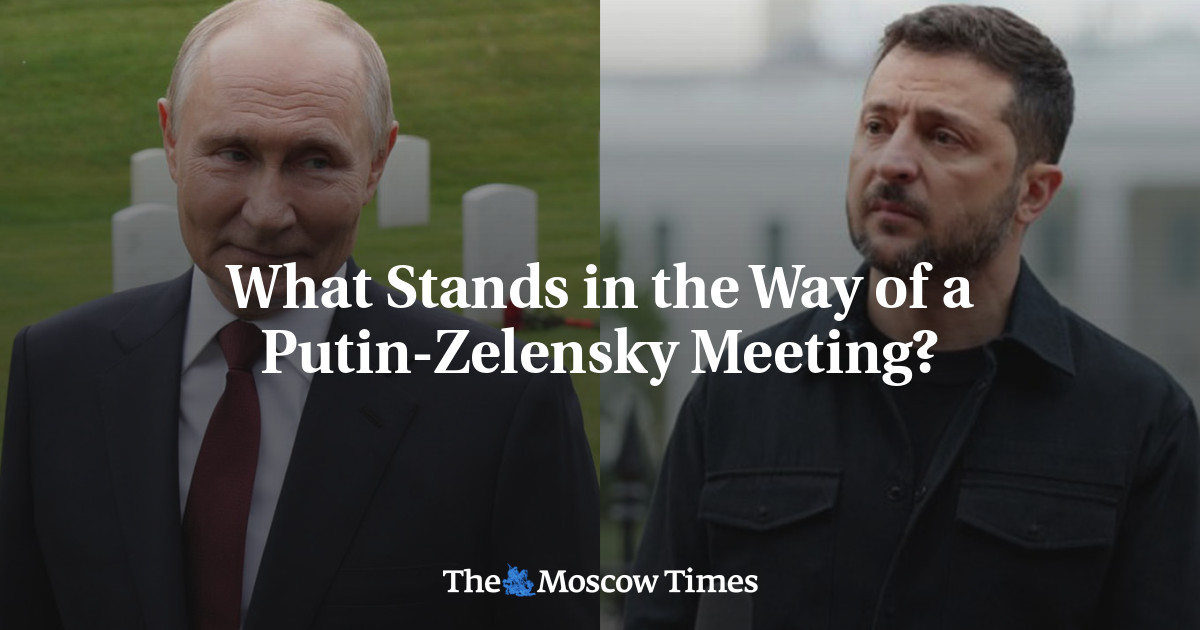
What Stands in the Way of a Putin-Zelensky Meeting?
How did your country report this? Share your view in the comments.
Diverging Reports Breakdown
What Stands in the Way of a Putin-Zelensky Meeting?
U.S. President Donald Trump is pushing for the two leaders to meet. Peace talks between Moscow and Kyiv in 2022 had collapsed, while renewed negotiations earlier this summer also failed to reach a breakthrough. Zelensky indicated he was ready to meet Putin following Monday’s talks in Washington, but said Thursday that he would only meet with the Russian leader after Ukraine’s allies agreed on security guarantees for Kyiv. The Kremlin has not confirmed whether preparations were in progress or even if Putin would agree to meet Zelenski. The venue also remains uncertain, particularly given that Putin is wanted by the International Criminal Court and is wanted for crimes against humanity in Russia and Ukraine, among other things. The two leaders have had no direct contact since the start of the full-scale invasion in 2022 and have met only once, as part of Normandy Format talks on resolving the war in eastern Ukraine in December 2019 in Paris. Despite having signed a decree effectively banning negotiations with Putin in 2022, Zelenky invited him to talks in Istanbul in May.
Ivan Stupak, an adviser to Ukraine’s parliamentary committee on national security, said that while “there is a consensus in Ukraine that the war needs to be stopped,” he believes Russia is unlikely to hold “a meeting for the sake of a meeting” and “will most likely drag out this issue and avoid meeting with Zelensky.” “First, a lot of paperwork must be done, there should at least be an understanding of what we are agreeing on…Only then can a future meeting between the two presidents be planned,” Stupak, a former Ukrainian security services officer, told The Moscow Times. There is still no confirmed date for a potential meeting. German Chancellor Friedrich Merz said on Tuesday that such talks could take place within the next two weeks. The venue also remains uncertain, particularly given that Putin is wanted by the International Criminal Court. Switzerland’s foreign minister said his country would grant Putin immunity from arrest if he came to the country for peace talks. Hungary has also offered to serve as a venue.
Putin had reportedly suggested holding the talks in Moscow in his call with Trump on Monday, to which Zelensky replied: “No.” Zelensky insists that talks should take place in a neutral part of Europe, with Switzerland, Austria or Turkey seen by Kyiv as suitable options. Legitimacy of talks Despite having signed a decree effectively banning negotiations with Putin in 2022, Zelensky invited the Russian leader to talks in Istanbul in May. Ukraine’s peace framework, which Kyiv’s delegation brought to bilateral talks in Turkey in June, also proposed a leaders’ summit to agree on key aspects of a peace agreement. The Kremlin, which has long sought to force a change in Ukraine’s leadership, has repeatedly said it views Zelensky as an illegitimate president, pointing to the fact that his term expired in 2024. Ukraine has postponed its presidential elections under martial law introduced after the invasion. “It doesn’t matter who conducts the talks, even if it is the current head of the [Kyiv] regime. I am even ready to meet, but only if it is a concluding stage — not to sit there endlessly dividing things, but to put a full stop,” Putin said in June. “But that full stop, that signature, must belong to legitimate authorities. Otherwise, you know, the next one will come and throw everything into the trash. That’s not acceptable — we are dealing with serious issues. That’s why I am not refusing — but a lot of work must be done first,” he added. Territorial stakes A key point of contention between Russia and Ukraine is the status of territories captured by Moscow in any peace agreement. Russia currently controls around one-fifth of Ukraine, including most of the Luhansk and Donetsk regions in the east and parts of the Zaporizhzhia and Kherson regions in the south, in addition to the Crimean peninsula, which Russia annexed in 2014.
Source: https://www.themoscowtimes.com/2025/08/21/what-stands-in-the-way-of-a-putin-zelensky-meeting-a90286
